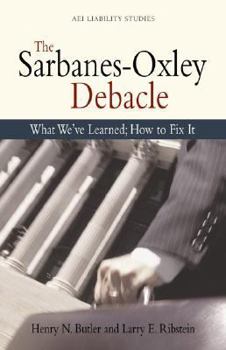The Sarbanes Oxley Debacle: What We've Learned; How to Fix It
The Sarbanes-Oxley Act of 2002 (SOX) is a colossal failure, poorly conceived and hastily enacted during a regulatory panic. Evidence suggests that the market has estimated that SOX will impose huge indirect costs on top of substantial direct costs. A largely overlooked concern is the act's potential to turn into a litigation time bomb: the first major market correction will likely become a feast for trial lawyers. SOX's defenders assert that the business...
Format:Paperback
Language:English
ISBN:0844771945
ISBN13:9780844771946
Release Date:May 2006
Publisher:AEI Press
Length:135 Pages
Weight:0.45 lbs.
Dimensions:0.5" x 5.4" x 8.5"
Related Subjects
LawCustomer Reviews
2 ratings
Especially recommended reading for policymakers and professionals in the field of corporate business
Published by Thriftbooks.com User , 18 years ago
Written by economics professor Henry N. Butler and law professor Larry E. Ribstein, The Sarbanes-Oxley Debacle: What We've Learned, How to Fix It is a sharp-tongued denouncing of the Sarbanes-Oxley Act of 2002, or SOX. SOX was a legal measure created in response to the misconduct of the Enron Corporation, with the intent of protecting investors by improving the accuracy and reliability of corporate disclosures. Yet the strict new rules affecting financial practices and corporate governance regulation that comprise SOX cause a heavy direct and indirect cost - one so great, according to The Sarbanes-Oxley Debacle, that it harms the very investors it was supposed to protect as surely as the companies themselves. By creating opportunities for excessive litigation, increasing risk aversion by managers, and distracting executives' attention from maximizing shareholder value, among other flaws, SOX's disadvantages far outweigh its advantages according to the authors - who have come up with a far more viable plan to repeal or legally challenge SOX and address the issues SOX was meant to handle in a more effective manner. Especially recommended reading for policymakers and professionals in the field of corporate business law.
A terrific evaluation of regulations that affect the value of your investments more than you know
Published by Thriftbooks.com User , 18 years ago
You can tell from the use of the debacle in the title that the authors evaluate the business effects of the Sarbanes-Oxley (SOX) regulations negatively. Their arguments are interesting and convincing. One of the great things about our system of government is that we can revisit excesses of the past and fix them over time. Butler and Ribstein take us through the climate that led to the enactment of this set of regulation and that was an over reaction to some large business failures. The collapse of the Internet Bubble led many to believe that the failures by fraud of Enron, WorldCom, Tyco, Adelphia and others were examples of the entire business community. We now know, as many knew then, that these were indeed exceptions. Criminal and causing injury to many, yes, but exceptions nonetheless. The authors make an argument that businesses and the investment community would have corrected the problems that led to the fraud on their own. Maybe. I think it likely that investors would have demanded that the things the fraudsters used to hide their bad deeds be done away with or without this regulation. I think the authors are quite compelling in demonstrating the excessive cost of SOX, especially for small businesses. This has distorting effects for the market because it prevents some companies from going public in order to avoid these costs. While the costs of these regulations to large companies may only be cents per $1,000 in sales (not insignificant, by the way), the costs for small companies can be several dollars per $1,000 in sales. Such costs can be crippling to the growth of a small firm. The issues surrounding SOX and foreign companies deciding to list in our markets or not because of these costs is also significant. The issues around outside directors and the legal liability put on CEOs are also quite significant. It sure sounds good to the public, but it can lead to a too conservative approach to business. Why take risk when it can lead to personal ruin? Yet, businesses exist to take risk. Establishing boards and hiring executives that are reticent to act can be costly for us all. Remember, it was fraud that caused the high profile failures, not risk taking in legitimate business ventures. Yet, the legal liability is a time bomb waiting to happen. All businesses face times when things don't work out as hoped. Under SOX firms face an increased likelihood of being sued by shareholders who are unhappy with the performance of their investment. The authors also show us the difference in tort suits today against a century ago. Before it was neighbors suing each other being evaluated by a local jury. Today, it is too often a local complainant with a local jury feeling entitled to tap the supposed deep pockets of the out of state corporation. Hence, another reason for reform of not only SOX, but of tort law. This is not a long book, but it is certainly informative. I recommend it for all business students who need to g





